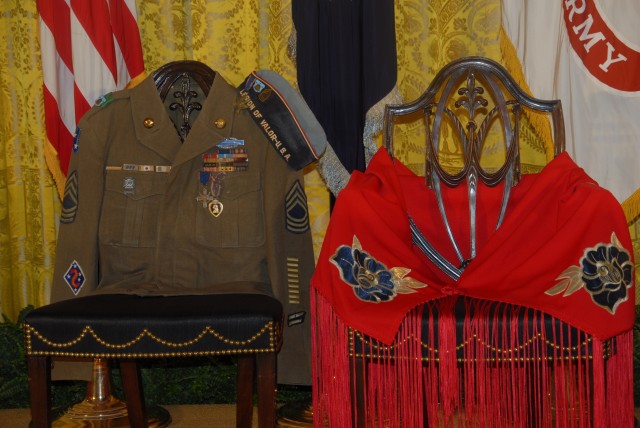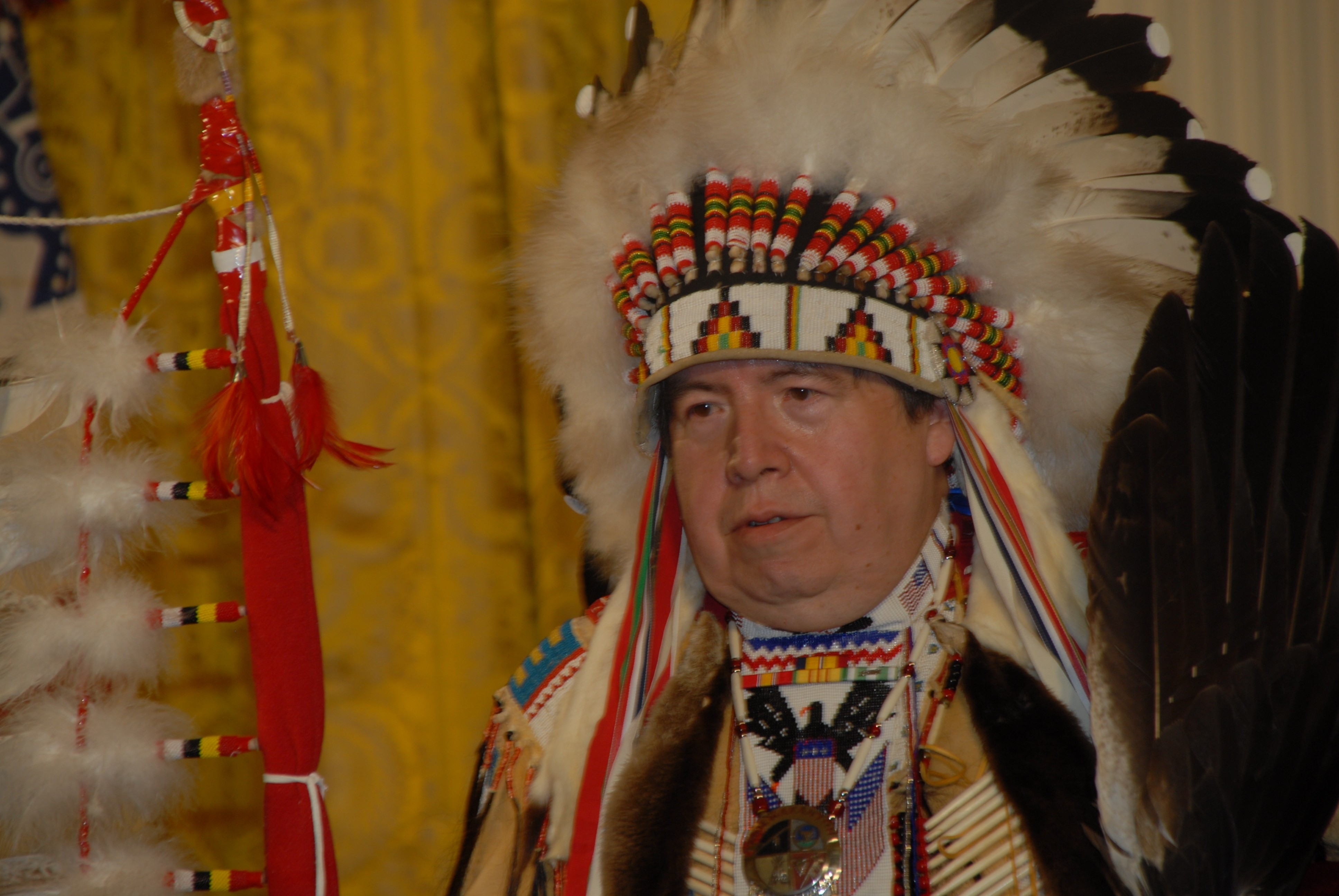WASHINGTON (Army News Service, March 4, 2008) Calling him a mentor, teacher and legend, President George W. Bush awarded the Medal of Honor posthumously March 3 to Master Sgt. Woodrow "Woody" Wilson Keeble.
Keeble is the first full-blooded Sioux Indian to be awarded the Medal of Honor and the 121st member of the National Guard to be awarded the nation's highest military award for valor, according to National Guard Educational Foundation records.
It was President Bush's ninth Medal of Honor ceremony, but he said this one was different.
"It's taken nearly 60 years for Keeble to be awarded the medal he earned on the battlefield in Korea," Bush said in the East Room of the White House.
Russell Hawkins, Keeble's stepson, accepted the medal. His stepfather had enlisted in the North Dakota National Guard in 1942.
The president described the former North Dakota National Guardmember as "strong, courageous, a great Soldier, a good Samaritan," in the White House ceremony attended by Vice President Richard Cheney; Secretary of Defense Robert Gates; the Joint Chiefs of Staff; Lt. Gen. H Steven Blum, chief of the National Guard Bureau; and numerous other civilian and military leaders. But the president focused on the 17 members of Keeble's surviving family and dozens of Sioux Indians, many of them uniformed veterans.
"His nominating paperwork was lost, and then it was resubmitted, and then it was lost again," Bush explained. "Then the deadline passed, and Woody and his family were told it was too late. Some blamed the bureaucracy for a shameful blunder. Others suspected racism. Whatever the reason, the first Sioux to ever receive the Medal of Honor died without knowing it was his. A terrible injustice was done to a good man, to his family and to history. On behalf of a grateful nation, I deeply regret that this tribute comes decades too late.
His voice lowered, the commander-in-chief became storyteller-in-chief as he honored Keeble by telling of his exploits as a Soldier on the battlefield and of the respect he earned as a citizen in his community.
"There are some things we can still do for him," Bush said. "We can tell his story. We can honor his memory. And we can follow his lead" by showing all those who have followed him on the battlefield the same love and generosity of spirit that Woody showed his country every day.
Keeble's Medal of Honor was awarded for action near Sangsan-ni, Korea, Oct. 20, 1951. The medal was awarded for conspicuous gallantry and intrepidity, at the risk of his life, above and beyond the call of duty.
Prior to Oct. 20, Keeble's company had taken heavy losses and the master sergeant himself had more than 83 grenade fragments in his body, Bush said. Defying his doctor, he returned to the battlefield Oct. 20.
"Communist forces still held a crucial hill," Bush said. "They had pinned down U.S. forces. One Soldier said the enemy lobbed so many grenades that they looked like a flock of blackbirds. Nothing seemed to be working. American boys were dying. But our forces had one advantage: Woody was back, and Woody was some kind of mad.
"He grabbed grenades and his weapon and climbed that crucial hill alone. Woody climbed hundreds of yards through dirt and rock, with his wounds aching, bullets flying and grenades falling. Someone remarked: 'Either he's the bravest Soldier I have ever met, or he's crazy.' Soldiers watched in awe as Woody single-handedly took out one machine gun nest, and then another. When Woody was through, all 16 enemy Soldiers were dead, the hill was taken and the Allies won the day."
The president credited Keeble's heroism with saving many American lives.
But Keeble's life wasn't defined by that act alone, and the president described the man who won the affection and respect of those with whom he served, of his fellow Sioux and of those who came into contact with him.
He was already a decorated veteran of World War II, for actions at Guadalcanal. The Chicago White Sox scouted him, but he would throw grenades, not baseballs. He led Soldiers through a minefield, putting himself at risk. He fought on despite two shots to the arm.
Though he suffered strokes after Korea and could not speak, after his first wife's death he courted a second woman, named Blossom.
"He wrote a note asking Blossom to marry him," Bush said. "She told him she needed some time to think about it. So, while she was deliberating, Woody put their engagement announcement in the newspaper. This is a man who was relentless in love as well as war."
On the platform behind the president were two empty chairs, honoring a Sioux tradition by representing Woody and Blossom and acknowledging their passing into the spiritual world.
The president called the master sergeant "an everyday hero" who despite his war injuries and strokes mowed lawns for seniors, helped rescue cars from snowbanks and was generous to those less fortunate than himself. He called him a devoted veteran who never complained about his missing medal.
"The Sioux have a saying: 'The life of a man is a circle,'" Bush said. "Today we complete Woody Keeble's circle from an example to his men to an example for the ages."
Hawkins talked about his stepfather after the ceremony. "We know how he lives with us in spirit," he said. "His honor will continue by the honor that his country gave him by recognizing him with the Medal of Honor."
"It means a lot to the Sioux nation," Hawkins said. "The traditional values that we had were ones of bravery, humility and generosity, and when you look at Woodrow's life as a Soldier and as a civilian, you can see that he exemplified all those qualities."
A National Guard armory is among places the family is considering displaying the medal so that the public can learn the story.
"Woodrow started his military service with the 164th Infantry, which is a National Guard unit in North Dakota," Hawkins explained. "The National Guard has been very, very supportive of Woodrow throughout all these efforts."
At the Pentagon today, Secretary of the Army Pete Geren called Keeble an extraordinary American hero. He quoted Keeble's own writings about his combat experiences: "There were terrible moments that encompassed a lifetime, an endlessness when terror was so strong in me that I could feel idiocy replace reason. Yet, I never left my position, nor have I shirked hazardous duty. Fear never made a coward out of me."
Geren hosted the Hall of Heroes ceremony with Deputy Secretary of Defense Gordon England and Gen. Richard Cody, the Army's vice chief of staff.
"He was a professional Soldier," said Lawrence Orcutt, who served alongside Keeble in Korea and was one of the numerous Soldiers who first nominated him for the Medal of Honor, said after the Pentagon ceremony. "Everywhere he went, I had confidence in the man and I would follow him. I'm glad he got this. I hope there's some way in our spirit world for him to know."
(Staff Sgt. Jim Greenhill writes with the National Guard Bureau.)








Social Sharing